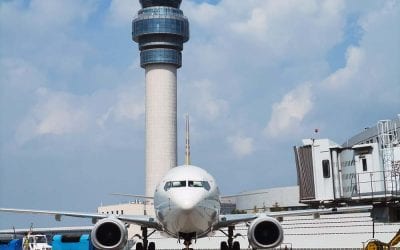The airlines, after enjoying two-weeks of collecting what should have been tax revenues, have dropped airfares as the FAA began taxing flights again. To passengers, who may not have been paying attention, it looks like airfares stayed level over the past month. However, for airlines it was a $400 million bonanza.
The 7.5 percent air transportation excise tax, according to law is built into the price of airline tickets. It is one of those taxes that is secretly in place by direct instruction of Congress, normally unseen by consumers. Therefor when the FAA stopped collecting these taxes on July 23rd, ticket prices would have been expected to drop by around 7.5 percent. Plus, passengers would have enjoyed an additional savings from the domestic take off and landing fees.
That didn’t happen. Conveniently, most airlines raised their prices to make it appear that airfares had not changed at all. In fact, when the airlines raised their prices, consumers weren’t aware of the increase in airfares unless they understood the tax structure.
The airlines provided plenty of excuses for their actions —
– We haven’t made overall profits for a decade
– We don’t want to confuse passengers by changing prices
– What passengers don’t know won’t upset them
Congress, on the other hand, was stunned at the avaricious move by the airlines to pocket what used to be tax monies. Even Senators and Congressmen who have long been zealous guardians of airlines’ interests were just about speechless. Their staffers, who are the ones defending airlines against an army of lobbyists and advocates, were incredulous and noticeably dismayed. And civil servants at the Department of Transportation were surprised.
Needless to say, there was going to be plenty of bridge building to be done between the airlines and Congress and DOT over this issue. The reduction in airfares that now matches the increase in taxes is the first step towards reconciliation. Airlines did not dare to increase airfares by the amount of the reinstituted taxes.
Will airfares creep up over the next few months? Who knows. Airlines are now facing a new reality of dropping oil prices as the stock market tanks after the downgrade of U.S. government bonds. The lower jet fuel prices that may result might make new airfare hikes less likely.
Then again, the same credit downgrade that accompanied the drop in stock and oil prices may make borrowing costs higher for the airlines, who are heavily leveraged in virtually every facet of their operation. Those increases in borrowing costs may eclipse the drop in fuel expenses and keep the airlines operating on very thin profit margins.
If it isn’t one thing, it is another.

Charlie Leocha is the President of Travelers United. He has been working in Washington, DC, for the past 14 years with Congress, the Department of Transportation, and industry stakeholders on travel issues. He was the first consumer representative to the Advisory Committee for Aviation Consumer Protections appointed by the Secretary of Transportation from 2012 through 2018.



